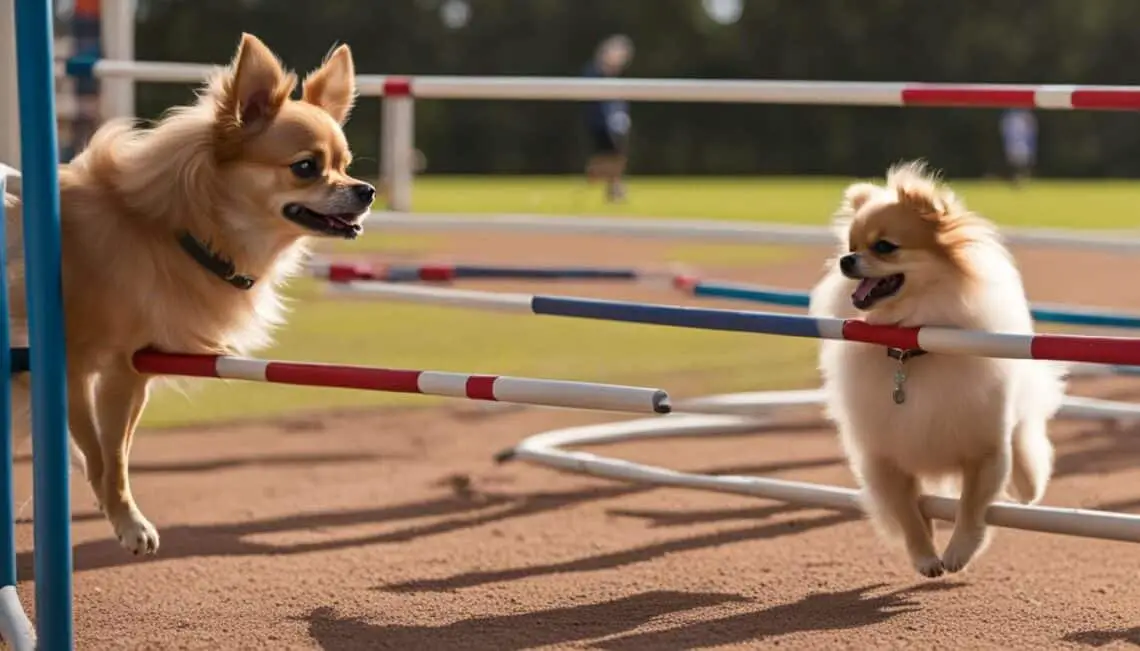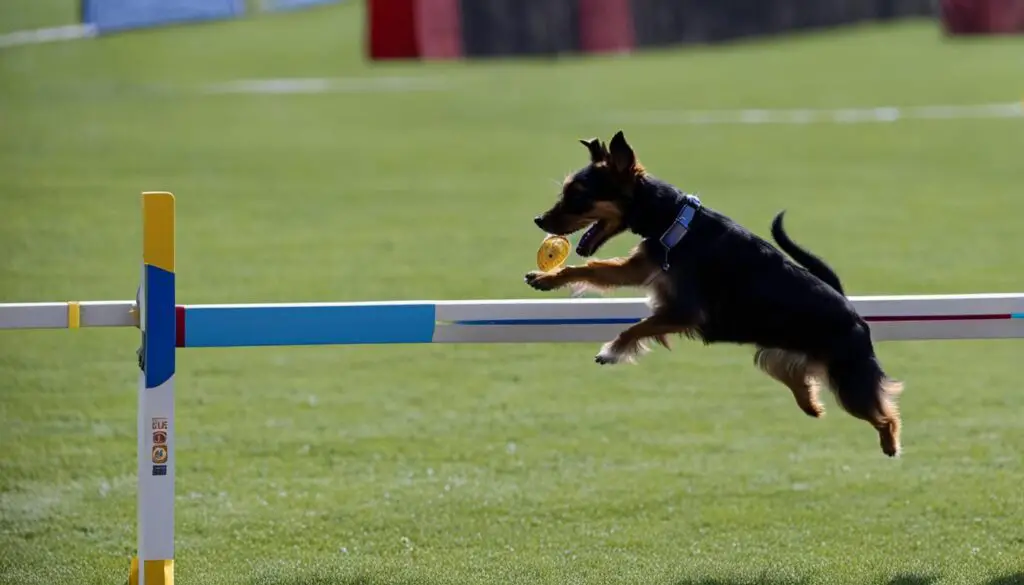Small dog breeds can present unique challenges when it comes to training. Many people believe that training small dogs is more difficult than training larger breeds, but the truth is that it simply requires some adjustments and understanding of their specific needs. In this section, I will explore the training challenges that small dog breeds may face and provide tips on how to overcome them.
Key Takeaways:
- Training small dog breeds requires adjustments and understanding of their specific needs.
- Respect your small dog’s needs and preferences during training.
- Utilize positive reinforcement and tailored training techniques for best results.
- Consistency and patience are key when training small dogs.
- Size should never be a determining factor of a dog’s ability to be trained and behave well.
Understanding Small Dog Behavior and Training Needs
Small dogs have their own unique behavior traits and training needs that should be understood and respected. While some may believe that small dogs are less trainable than larger breeds, this misconception stems from a lack of understanding about their individual needs. It is crucial to approach training small dogs with patience, empathy, and a tailored training approach.
Respecting your small dog’s needs is essential for their well-being and successful training. Small dogs can be more sensitive to their surroundings and may feel overwhelmed in certain situations. It is important to protect them from unwanted attention or interactions that may cause stress or anxiety. By creating a safe and comfortable environment for your small dog, you can help them feel secure and build trust.
“Small dogs may be small in size, but they have big personalities and can be just as intelligent and trainable as their larger counterparts. It’s crucial to approach their training with respect and understanding, acknowledging their unique needs and preferences.”
Contrary to popular belief, small dogs are not inherently less trainable than larger breeds. They can excel in obedience training, agility, and other activities when provided with appropriate training methods. Positive reinforcement techniques, such as rewards and praise, work well with small dogs as they respond favorably to encouragement and positive experiences. Consistency in training sessions and setting clear boundaries are key to helping small dogs understand what is expected of them.
Respecting Small Dog Needs
To effectively train small dogs, it is important to consider their specific needs. Here are some tips for respecting small dog needs during training:
- Provide a quiet and calm training environment to minimize distractions.
- Use gentle handling techniques to build trust and prevent fear or discomfort.
- Adjust training sessions to shorter durations, as small dogs may have shorter attention spans.
- Offer frequent breaks and rewards to keep your small dog engaged and motivated.
- Avoid using physical punishment or force, as this can lead to fear and aggression.
- Be mindful of their physical limitations and avoid activities that may put strain on their small bodies.
By understanding and respecting the unique behavior traits and training needs of small dogs, you can create a positive and successful training experience for both you and your furry companion.
| Behavior Trait | Description |
|---|---|
| Sensitivity | Small dogs can be more sensitive to loud noises, sudden movements, and unfamiliar environments. |
| Territorial | Small dogs may exhibit territorial behavior, often defending their owners or personal space. |
| Attention-Seeking | Some small dogs may crave attention and may engage in attention-seeking behaviors if not properly trained. |
| Stubbornness | Like dogs of any size, small dogs can be stubborn, but consistent training methods can help overcome this trait. |
Effective Training Techniques for Small Dog Breeds
Training small dog breeds requires a tailored approach to address their unique needs and challenges. By utilizing effective training techniques, you can enhance the learning experience and ensure successful outcomes for your small furry companion.
Consistency is Key
Consistency is vital when training small dogs. Establish a routine and stick to it. Use clear and consistent commands, gestures, and cues to teach your dog desired behaviors. Reinforce positive actions with praise and rewards, such as tiny treats specifically designed for small dogs. By maintaining a consistent training approach, your small dog will learn more quickly and retain the commands more effectively.
Getting down to Their Level
During training sessions, make yourself smaller to create a comfortable and non-threatening environment for your small dog. This can be achieved by crouching down to their level or sitting on the floor. By doing so, you build a stronger bond and establish trust, making it easier for your small dog to focus on the training tasks at hand.
Reach-Extending Tools
Reach-extending tools, such as a short leash or a training stick, can be beneficial when training small dogs. These tools provide an extended reach, allowing you to guide and direct your dog’s movements more effectively. This is particularly useful when teaching them commands that require distance, such as “stay” or “come.” Remember to pair the use of such tools with positive reinforcement to create a positive association with their usage.
Identifying and Overcoming Training Problems
Small dog breeds may encounter specific training problems that require additional attention and patience. Common issues include excessive barking, separation anxiety, and leash pulling. To address these problems, consult with a professional trainer who specializes in small dog breeds. They can provide expert guidance and advice tailored to your dog’s specific behavior and circumstances.
| Common Training Problems for Small Dogs | Solutions |
|---|---|
| Excessive Barking | Redirect their attention, provide mental stimulation, and reward quiet behavior. |
| Separation Anxiety | Gradually desensitize your dog to being alone, using positive reinforcement and crate training. |
| Leash Pulling | Teach loose leash walking using positive reinforcement techniques and patience. |
Conclusion
Training small dog breeds can present its own set of challenges, but with the right approach and understanding, it is entirely possible to develop a strong bond and well-behaved companion. Despite their size, small dogs are just as capable of learning and excelling in various training activities as their larger counterparts.
Respecting the unique needs of small dogs is essential for successful training. By considering their preferences and protecting them from unwanted attention, we can create a safe and comfortable environment that facilitates effective learning.
Utilizing positive reinforcement techniques and tailored training methods can make a significant difference in the success of training small dogs. Consistency, the use of tiny treats as rewards, and making yourself smaller during training sessions are all strategies that can enhance the learning experience. Additionally, reach-extending tools can be beneficial in certain situations.
Remember, the size of a dog should never be a determinant of their ability to be trained and behave well. By incorporating these techniques, being patient and consistent, and showing respect for their needs, small dog owners can help their furry companions become well-mannered and obedient.
FAQ
Are small dogs harder to train than larger breeds?
No, small dogs are just as capable of learning and behaving well with the right training. They may have different behavior traits, but with proper training techniques, they can excel in various training activities.
How should I treat my small dog during training?
It is important to treat your small dog with respect and consider their needs and preferences. By understanding and respecting their needs, you can develop a strong bond and help them become well-mannered and obedient.
What are some effective training techniques for small dog breeds?
Utilizing positive reinforcement and tailored training methods can make a significant difference in training small dogs. Consistency, the use of tiny treats, making yourself smaller during training sessions, and reach-extending tools can all be helpful techniques to train small dogs.
What if I encounter training problems with my small dog?
Training problems can arise with any dog, regardless of size. However, by understanding the specific challenges that may occur with small dogs and using appropriate solutions, such as adjusting training methods or seeking professional help if needed, you can overcome these problems and continue training effectively.






No Comments